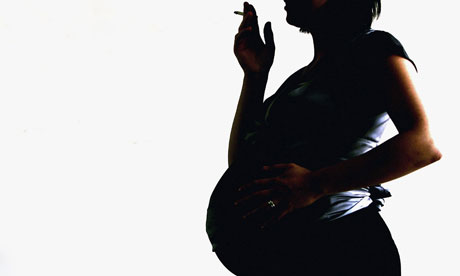
Doctors are urging mothers-to-be to give up cigarettes after new research linked smoking in pregnancy to babies suffering birth defects such as clubfoot, missing limbs and deformed limbs.
Those who smoke while expecting a baby increase the risk of their child being born with a serious malformation by as much as 50%, the study found. The disclosure led to calls for new measures to reduce what the authors called "staggeringly high" levels of smoking among pregnant women.
Although smoking by pregnant women has already been linked to a higher risk of a woman having a miscarriage or her baby being born prematurely or having a low birth weight, 45% of women under 20 do so while one in seven is still a smoker when she gives birth.
The authors from University College London said their paper was "the first comprehensive review to identify the specific birth defects most associated with smoking."
They reviewed 172 research papers published in the past 51 years covering 174,000 cases of birth defects. They concluded that for women who smoke while pregnant "the risk was increased by 26% for having a baby with missing or deformed limbs, 28% for clubfoot, 27% for gastrointestinal defects, 33% for skull defects, 25% for eye defects and 28% for cleft lip/palate."
The biggest increase in risk was for their baby having a birth defect called gastroschisis, in which part of its stomach or intestines protrude through the skin.
"People think that few women still smoke when pregnant. But the reality is that particularly in women under 20, the numbers are still staggeringly high", said Professor Allan Hackshaw, the lead author, who is based at the UCL cancer institute. Public health education efforts usually do not mention birth defects as a possible result of maternal smoking, because until now it was not known which ones were linked.
"Now we have this evidence, advice should be more explicit about the kinds of serious defects such as deformed limbs, and facial and gastrointestinal malformations that babies of mothers who smoke during pregnancy could suffer from. The message from this research is that women should quit smoking before becoming pregnant, or very early on, to reduce the chance of having a baby with a serious and lifelong physical defect", added Hackshaw.
Recent NHS data showed the proportion of pregnant women who were still smoking when they delivered their baby had fallen from 16.1% in 2006 to 14% in England last year, but was as high as 31.4% in Blackpool.
Janet Fyle, professional policy adviser at the Royal College of Midwives, said the study underlined that smoking both before conception and while pregnant damaged both the mother and foetus's health.
"Women thinking of becoming pregnant; pregnant women and women with young children should be told about the negative effects of smoking and the impact on their long-term health and that of others living in the home. Midwives should advise women who smoke to give up smoking and refer them to stop smoking services to help them quit," said Fyle. "Partners should also consider this as a good time to consider giving up smoking."
Professor Michael Patton, a consultant clinical geneticist at St George's hospital medical school in London and medical director of disabled children's charity Newlife Foundation, said: "We have known for many years that smoking is harmful to the growth of the baby but this comprehensive review of the research on smoking in pregnancy also identifies the risk of causing certain birth defects and disabilities in the baby. This is an important health message as there are still many mothers, particularly young mothers, who continue to smoke in pregnancy."
The Department of Health said women who smoked while pregnant should give up. "Smoking in pregnancy is a major public health concern posing risk to both mother and their baby's health", said a spokeswoman. The coalition's recent Tobacco Control Plan aimed to reduce rates of smoking throughout pregnancy to 11% or less by the end of 2015.

